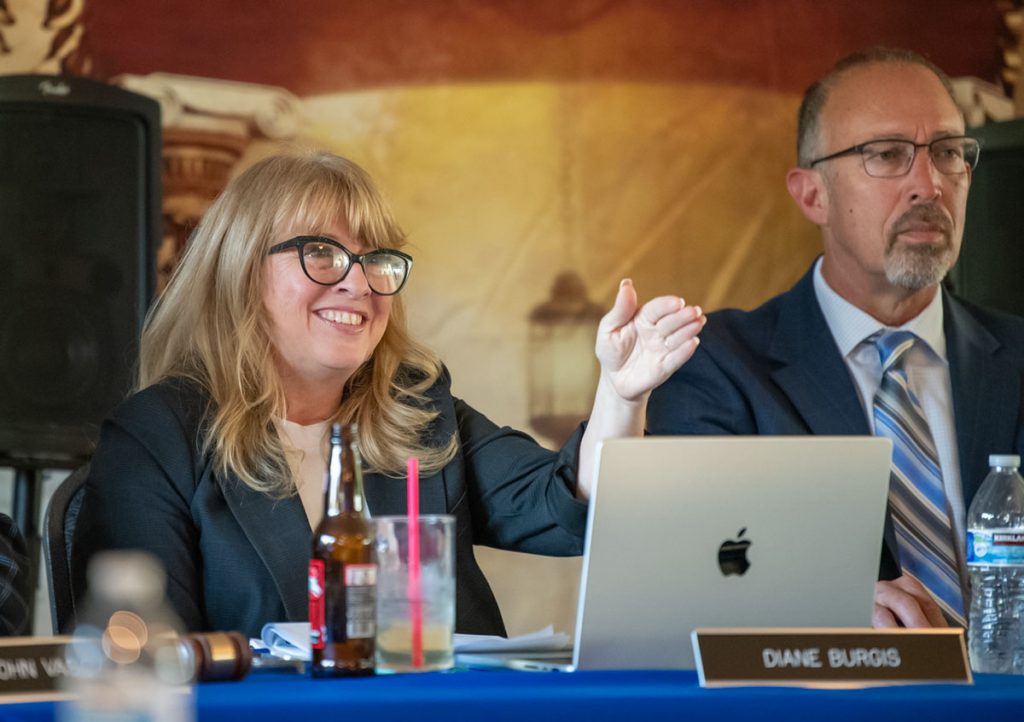Delta Protection Advisory Committee to gain Tribal representative

Delta Protection Commission Chair Diane Burgis
STOCKTON, Calif. (Sept. 21, 2023) – The Delta Protection Advisory Committee (DPAC) will gain a tribal representative under action taken Thursday by the Delta Protection Commission.
“It’s about engagement, opportunity and giving the tribes a voice on DPAC,” said Delta Protection Commission Executive Director Bruce Blodgett.
Commission Chair Diane Burgis, who also serves on the Contra Costa County Board of Supervisors, emphasized the importance of the perspective a tribal representative will bring.
“Native American tribes have thousands of years of deep memory of the Delta from before Europeans came,” she said. “Tribal voices should have a voice in how we manage our land and water. This is not us checking a box; Native knowledge will help us do a better job caring for the Delta.”
DPAC was created in 2009 by amendments to the 1992 Delta Protection Act. Whereas the Delta Protection Commission has majority representation from local government and water agencies, the Advisory Committee is composed of Delta stakeholders, including representatives in agriculture, recreation, natural resources, local communities and infrastructure.
Its role is to provide recommendations to the Commission regarding the Delta ecosystem, water supply, socioeconomic sustainability, recreation, tourism, agriculture, flood control, environment, water resources, infrastructure, Delta values and other Delta issues.
Tribal presence in the Delta
The Sacramento-San Joaquin Delta is critically important to modern-day Californians – with its fertile farmland, water that helps meet the needs of 27 million people, diverse recreation and tourism opportunities, and history-drenched network of small farm communities.
But prior to Spanish, Mexican, and American settlement, the Delta watershed was inhabited, carefully tended, and revered by diverse peoples: Bay Miwok, Coast Miwok, Plains Miwok, Maidu, Nisenan, Ohlone, Patwin, Pomo, Wappo, Wintun, and Yokuts.
Despite great resistance, their land was occupied by new settlers, and their populations decimated by disease and genocidal campaigns. But the descendants of these original inhabitants, including sovereign tribes, are still among us, and still carrying out traditional practices in the region.
Representatives of four tribes made clear their desire to be consulted early and often on matters affecting the Delta during a Tribal Listening Session held in April by the Delta Stewardship Council, another state agency. (Read about the session here, or watch a recording – the listening session starts at 2:49:22 and runs nearly to the end of the recording.)
The representatives – who spoke for the Buena Vista Rancheria of Me-Wuk Indians, Shingle Springs Rancheria of Miwok Indians, United Auburn Indian Community, and Paskenta Band of Nomlaki Indians – also emphasized their continuing wish to be guardians of the region, along with its other modern-day inhabitants and leaders.
DPAC’s new membership
In addition to getting a new tribal representative, DPAC will get another position representing the general public as a result of Thursday’s action – a unanimous vote – raising the total membership to 17.
With the expansion of the Committee approved, Commission staff will now develop an application process for the two new members, who will serve three-year terms.
DPAC is not the Commission’s only committee with tribal representation: Tribal representatives also serve on the Delta National Heritage Area Management Plan Advisory Committee, both as general and ex officio members. Their input has been crucial.
Additional resources:
- Delta Protection Commission’s Tribal Consultation Policy (2019)
- News release: Governor Newsom Issues Apology to Native Americans for State’s Historical Wrongdoings, Establishes Truth and Healing Council (2019)
- Gavin Newsom’s Executive Order N-15-19 (PDF) (2019) apologizing for the “violence, maltreatment and neglect California inflicted on tribes,” and creating a Truth and Healing Council
- Delta Narratives: Saving the Historical and Cultural Heritage of the Sacramento-San Joaquin Delta (PDF) (2015) – a report to the Delta Protection Commission prepared by the Center for California Studies at California State University, Sacramento (contains many sections on and references to the region’s tribes)
- Gov. Edmund G. “Jerry” Brown Jr.’s Executive Order B-10-11 (2011) creating the position of Governor’s Tribal Advisor and making government-to-government consultation with tribes a state policy.

